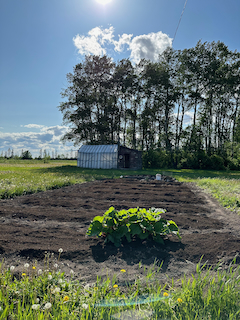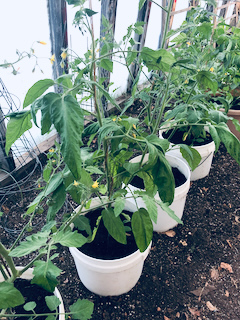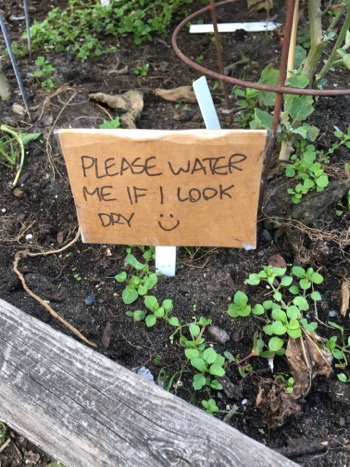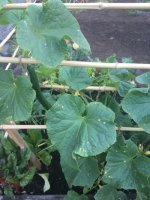Need help growing vegetables?
Growing vegetables is easier than you think. Still not sure where to begin? Well let's start with some basics.
A vegetable plant has the same basic needs as we do to grow and thrive: light, food, water, and warmth. The amount each vegetable plants needs can be quite different so here are my tips
Here you will find all the gardening advice you will need to grow your own food.
 Choose the right site to grow vegetables
Choose the right site to grow vegetablesHow much sunlight is needed for growing vegetables?
Light is one of the most important elements in growing veggies and is probably the one thing we have least control over. When choosing a site for growing vegetables consider the amount of light that area will be getting during the day.
Vegetables that produce fruit like tomatoes, peppers, eggplant, and squash are the ones that need full sun. These can be easily be grown in containers on a sunny patio if you do not have a full sun garden site.
Most vegetables need an average of 6 hours of sunlight. If you do not have an area with this much sun do not be put off starting your garden. Some leaf and root vegetables such as lettuce, peas, carrots, kale, swiss chard will tolerate some shade.
For those of you that do not have full sun spots, Container gardening is a wonderful way to grow some vegetables.
 Growing Tomatoes in Containers
Growing Tomatoes in ContainersHow does the plant get food?
The soil provides a place for plant roots to grow and they draw up nutrients from that soil. Plants need nitrogen, phosphorus, potassium and micro nutrients to grow well. These nutrients are usually present naturally in soil however they use up a lot to grow so amending your soil regularly with compost and other organic matter will give you better results over time.
Vegetables can be grown in poor soil but you may be discouraged by how they grow. When growing vegetables give them nutritious food and they will produce abundantly for you. Learn more about your soil here.
How much water does a vegetable plant need?
On average most vegetable plants need 1 - 2 inches of water each week especially from mid June to mid August or when it it hot.
Too little water- plant roots will not grow deep and strong enough to gather nutrients for good growth.
Too much water - will saturate the soil, not allowing the plant air and space needed to grow.
For best results it is important to know how much water your plants are getting. Observe your vegetables, get to know your soil conditions, keep an eye on the weather and learn which plants need more water than others. Is this sounding too complicated?

How often do you water?
Irrigate your vegetable garden twice a week, giving 1/2 the water
requirement with each watering. It will depend on your climate but all
of us will need to water our gardens at some point in the season.
Container gardening has different rules for watering.
What is the best way to water as every plant is different?
Some plants ( lettuce, spinach, salad greens, swiss chard ) like to be sprayed to stay cool. Other plants are adversely affected by overhead watering ( tomatoes, squash, carrots ) because the water can cause fungus and disease on the leaves.
Still other plants have such large leaves that overhead watering does not allow enough water to get to the roots broccoli, cabbage, cauliflower.
Overhead sprinkling is probably still the most popular way of watering however drip, trickle or seeping hoses are becoming more common place now as well.
I recommend using both as each are best for certain plants. If you have a small garden and hand water, it is easy to do both; spray the leafy vegetables and water around the base of the root vegetables.
When is the best time to water?
Before 11am or after 4pm. Let plants dry off before dark so they are less likely to get fungus or disease.
Easy tip to measure how much water plants are getting:
Place a small can in 4 different areas of your garden, turn on the overhead sprinkler for 1 hour and then measure the amount of water in your cans.
When growing vegetables why do they need warmth?
The air and soil temperature is most important for seed germination. Some seeds do best in cool soil (lettuce, peas, radishes) others need warm soil (tomatoes, squash, corn) to grow.
All plants need some warmth to grow, some more than others. We do have some control over this basic need as we can supply plants with extra heat using heating pads, cold frames, plastic or cloth covers.
Here is a list of vegetables and my vegetable garden journal with simple vegetable growing tips to help you stay organized and enjoy your best vegetable garden ever.
Please take the time to subscribe to my monthly newsletter "Vegetable Gardening Hints".
Please take the time to subscribe to my monthly newsletter "Vegetable Gardening Hints".
Rhubarb is an extremely easy vegetable to grow, and versatile when it comes to recipes, find out
how to grow rhubarb
at Rhubarb Central.com.
Interested in starting a rhubarb garden and enjoying all of the great things you can make with your rhubarb?
savor-the-rhubarb.com
can help.
Returning from Growing Vegetables to Homepage
Recent Articles
-
Vegetable Gardening Frustrations: Lessons for a Better Harvest
Oct 29, 24 07:37 PM
Every vegetable gardener knows that while the rewards are sweet, the vegetable gardening frustrations can be a bit bitter. -
Small Space Vegetable Gardening
Sep 23, 24 05:06 PM
Small Space Vegetable Gardening - Tips for growing vegetables in small spaces. -
Why Fall Gardening?
Aug 16, 24 12:24 PM
Fall Gardening: A guide to a Bountiful Harvest.




